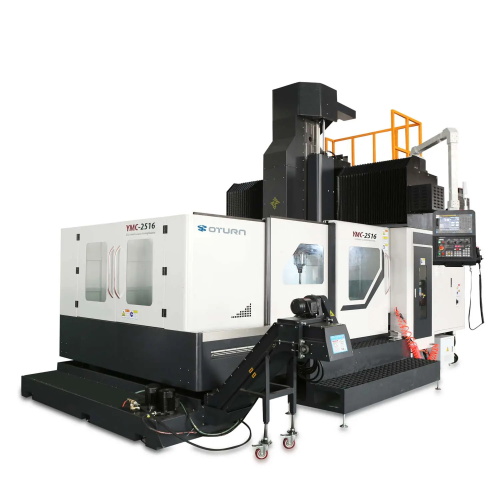In modern mechanical machining, CNC gantry machining centers are highly valued for their powerful machining capabilities and efficient performance, making them essential equipment for manufacturing large and complex parts. The two mainstream types in the market are the fixed-beam moving-table and moving-beam moving-column CNC gantry machining centers. Although they differ in structure and performance, they share the following common advantages:
· Strong machining capability, efficiently handling large and heavy workpieces;
· Support for multi-axis simultaneous, meeting the high-precision machining needs of complex parts;
· Intelligent control systems equipped with automatic tool changers and online detection, enhancing machining stability and efficiency;
· Wide industry applications, covering aerospace, automotive manufacturing, mold making, and more;
· Comprehensive safety designs to protect operators and equipment.
Understanding these commonalities helps grasp their core value. Next, we will deeply compare the fixed-beam moving-table and moving-beam moving-column gantry CNC machining center from the perspectives of structural design, performance, and applicable scenarios to assist you in making a more informed equipment choice.
I. Structural Design Differences
|
Type |
Fixed-Beam Moving-Table CNC gantry machining center |
Moving-Beam Moving-Column CNC gantry machining center |
|
Gantry Frame |
The gantry frame formed by the beam and columns is fixed, offering strong rigidity |
The beam and columns can move along the bed guideways on the X-axis, with the beam moving vertically |
|
Worktable Movement |
The worktable moves along the X-axis carrying the workpiece |
The worktable is fixed or moves within a small range, with the workpiece fixed |
|
Tool Movement |
The tool is mounted on a fixed beam’s ram, moving along the Y and Z axes |
The tool moves with the beam and columns vertically and horizontally |
|
Rigidity |
High overall machine rigidity, suitable for heavy cutting and high-precision machining |
Flexible structure with relatively lower rigidity, meeting most conventional machining needs |
The fixed-beam moving-table CNC gantry machining center’s fixed gantry frame is as solid as a “city wall,” effectively resisting cutting forces and vibrations during machining, suitable for high rigidity and precision. The moving-beam moving-column type offers greater structural flexibility, allowing adjustment of the gantry position and height according to workpiece size and shape.
II. Performance Comparison
|
Performance Indicator |
Fixed-Beam Moving-Table CNC gantry machining center |
Moving-Beam Moving-Column CNC gantry machining center |
|
Rigidity & Stability |
Excellent, suitable for heavy cutting and precision machining |
Good, flexible structure but slightly less rigid during heavy cutting |
|
Machining Accuracy |
High, equipped with high-precision guides and closed-loop feedback, ideal for precision parts |
Good, but more moving parts make ultra-precision machining more challenging |
|
Machining Efficiency |
High, suitable for batch production with fast worktable movement |
Flexible, convenient for multi-variety small-batch production and easy position adjustment |
|
Adaptability |
Suitable for large, heavy parts |
Suitable for complex shapes and varied-size parts |
III. Machining Efficiency and Flexibility
Moving-Beam Moving-Column: The movable gantry frame offers flexibility, especially suitable for multi-variety, small-batch production, reducing fixture adjustment time and improving responsiveness.
IV. Other Key Differences
|
Aspect |
Fixed-Beam Moving-Table CNC gantry machining center |
Moving-Beam Moving-Column CNC gantry machining center |
|
Maintenance & Upkeep |
Stable structure, simpler maintenance, longer service intervals |
More moving parts, complex maintenance, higher upkeep frequency |
|
Footprint & Installation |
Heavier equipment, larger footprint, suited for fixed production lines |
Compact structure, smaller footprint, adaptable to varied workshop layouts |
|
Energy Consumption & Cost |
Higher energy consumption due to heavy moving table, but stable operation and controllable long-term cost |
Lower energy consumption with lighter moving parts, but potentially higher maintenance costs |
V. Recommended Application Scenarios
|
Type |
Typical Application Fields |
Suitable Workpiece Characteristics |
|
Fixed-Beam Moving-Table |
Automotive engine blocks, generator stators, large ship propellers, aerospace structural parts |
Large, heavy parts with high precision and rigidity demands |
|
Moving-Beam Moving-Column |
Mold making, complex part machining, small-batch diversified production |
Complex shapes, widely varying sizes, requiring flexible position adjustment |
VI. Summary
Both fixed-beam moving-table and moving-beam moving-column CNC gantry milling machine have their strengths. The former excels in rigidity and precision, ideal for heavy-duty and high-accuracy machining; the latter offers structural flexibility, better suited for diverse parts and small-batch production. Enterprises should scientifically select equipment based on workpiece size, machining precision, production volume, and workshop environment to improve efficiency and quality.
About OTURN
OTURN specializes in high-end CNC machines, offering a variety of CNC gantry machining centers. Our products integrate advanced mechanical design and intelligent control technology to meet diverse needs in aerospace, automotive, mold manufacturing, and more. OTURN is committed to providing customers with high-rigidity, high-precision, and high-efficiency machining solutions, helping enterprises enhance competitiveness and achieve intelligent manufacturing transformation.
Welcome to contact us for professional equipment selection advice and technical support.
Post time: Jun-24-2025








